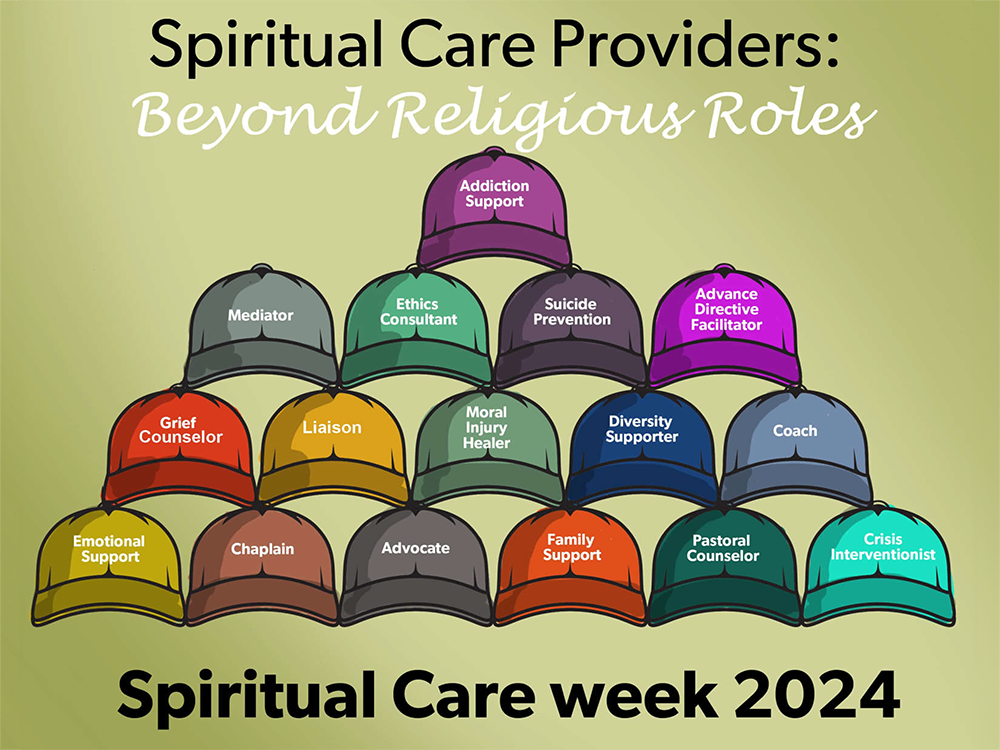How can we help?
888-283-1722
Call us now at 888-283-1722
24/7 Referrals and Nursing Support
Voices of Care Blog

Spiritual Counselors: Beyond Religious Roles
Posted on October 21, 2024 by Rev. Sharon Dunbar-Link, M. Div.This blog was submitted as part of Spiritual Care Week, which is October 20-26.
Did you know that spiritual counselors and chaplains wear many hats? Well, we do. Every year in October, Spiritual Care Week recognizes spiritual care and the work of spiritual caregivers. As a hospice spiritual counselor (a recent name change from chaplain), I've found that it's not unusual for others to be unaware of the extent of roles we perform and services we offer.
The Many Hats of a Spiritual Counselor
The theme of this year's Spiritual Care Week is "Spiritual Caregivers: Beyond Religious Roles." In this context, religious roles can mean prayer, sharing sacred texts, offering sacraments, blessings, and facilitating memorial/funeral services. These are the things one might expect when considering the role of a spiritual counselor. But our team often seeks to make connections even with those who don't have a traditional religious identity or practice.
As a hospice spiritual counselor, I begin by introducing myself to a patient or family. My hope is that over a short time, we'll build the foundation of a trusting relationship. However, I often encounter this question: "What does a spiritual counselor do?"
I find it challenging to explain because there are multiple roles I might fulfill. Some of the hats we wear include:
- Coach
- Crisis Intervention Specialist
- Diversity/Inclusion Supporter
- Ethics Consultant
- Mediator and Family Support
- Moral Injury Support Provider
- Liaison
The Power of Listening
Listening is often the largest part of my work. This can be approached from an emotional perspective, spiritual perspective, or both.
Sometimes, when someone has hesitantly agreed to a visit, the first thing they say when I arrive at their home is that they don't have anything to talk about. I'll respond by letting them know that's okay. And then, the person often talks for 10 minutes or more, concluding with, "I don't know why I just told you that."
As I tell them, our role is to help people connect with their own spirit and sense of spirituality.
Building Trust Through Unconventional Means
I had a patient who had initially declined spiritual care. After being on our services for a few weeks, the social worker on the team invited me to join him on a visit. The patient accepted both of us to sit with her in her kitchen.
I didn't say much until the patient mentioned that she used to play cribbage with a friend. Sensing an opening, I told her that I love to play cribbage. She and I scheduled a return visit to play a game, just the two of us.
During our game, we were close in score. I suspected that I was going to win and faced a dilemma. If I held back a bit and let her catch up, she might suspect I wasn’t trying. But if I beat her, would she get frustrated and potentially turn me off? I chose to play honestly and ended up winning. It turned out to be the right move because we then scheduled another game for this patient to try to win the next time.
Eventually, she went to the Kaplan Family Hospice House. Remember, this was not a religious person, and we never explicitly talked about religion or spiritual practices. When I visited her to bring closure to our work together, she agreed to my singing her a blessing. And next, she asked if I would conduct her memorial service.
This exemplifies being patient and waiting for the person to feel ready to accept care through a non-religious approach.
Addressing Moral Injury
I have also worked with patients who have experienced moral injury. This means that a person may have needed to set aside some aspect of their principles and values in their experience or work. This can be the case with veterans, based on what they experienced in their service.
I remember one gentleman who was stationed in a bomber airplane. He told me that every time they dropped a bomb, he prayed for those on the ground who might be injured, harmed, or killed. He realized that his actions resulted in trauma and shock for those beneath, changing their lives within minutes.
Did he need to experience forgiveness? I think he did. This kind of dilemma is not resolved by prayer and blessing and then moving on to the next person. It takes time, skill, and a non-judgmental and patient way of listening.
At Care Dimensions, we have a wonderful team of 22 spiritual counselors. We are diverse, skilled, and happy to meet patients and family members where they are, without judgment or the mission to change them. It is our privilege to serve, no matter which hat we are wearing when we are called.
Additional Posts
Tips for Caregivers of Grieving Children with Developmental Delays
Posted on January 22, 2026 by Bridget McHallam, Child Life Intern in ChildrenWhen children with developmental delays experience loss, grief can look different. This article explores how children understand death and offers practical ways caregivers can provide comfort and support. ...
Continue readingMemory Making Activities for Children Before and After a Death
Posted on November 17, 2025 by Bridget McHallam, Child Life Specialist Intern in ChildrenFor many children and teenagers, engaging in memory-making activities can be a meaningful way to express love, connection, and remembrance. Here are some suggested activities. ...
Continue readingUnderstanding "Grief Fog": The Science Behind What You're Feeling
Posted on October 28, 2025 by By Heather Arteaga, LCSW, Greater Boston Bereavement Coordinator and Patrice DePasquale, LICSW, Director of Bereavement and Pediatric Palliative Care ProgramIf you've lost someone dear to you, you may have experienced what grief counselors call "grief fog.” Read strategies to help get through this phase. ...
Continue readingAnyone—patient, family, care provider—can make a referral. Fill in the form online or call us today.
Since 1978, Care Dimensions, formerly Hospice of the North Shore, has provided comprehensive and compassionate care for individuals and families dealing with life-threatening illnesses. As the non-profit leader in advanced illness care, we offer services in over 100 communities in Massachusetts.
Copyright 2026 | Care Dimensions, 75 Sylvan Street, Suite B-102, Danvers, MA 01923 | 888-283-1722 | 978-774-7566 |









